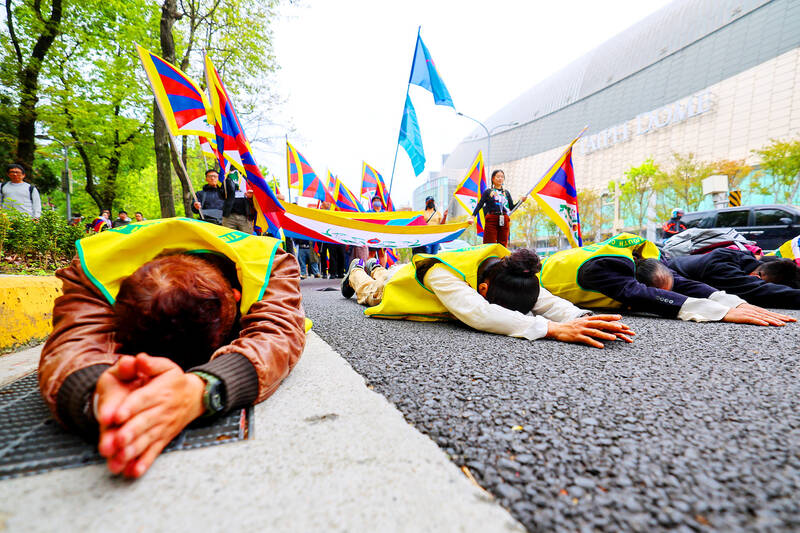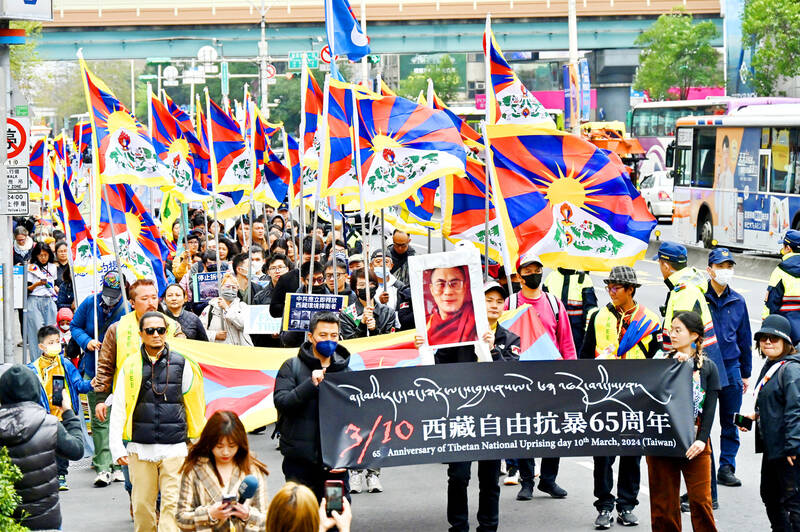Civic groups commemorating the 1959 Tibetan uprising in Taipei yesterday called for an end to China’s use of state-run residential schools to “exterminate” Tibet’s culture and language.
Kelsang Gyaltsen Bawa, representative to Taiwan of the Tibetan government in exile, one of the organizers of yesterday’s event, said that students at the schools are taught exclusively in Mandarin and forbidden from learning about Tibet’s history.
The Chinese government should cease its attempts to “exterminate” Tibet’s religious and cultural traditions by forcing people to study a Han-centric curriculum, Bawa said.

Photo: CNA
The UN said that as of last year, nearly 1 million Tibetan students attended state-run residential schools, which have been described as a form of “abduction and forced assimilation” by the European Parliament.
Tibetan Youth Association in Taiwan president Kunchok Lhakpa called on China to stop construction of a hydroelectric dam in Sichuan Province, which opponents say would submerge several ancient Tibetan monasteries.
Chinese police last month arrested more than 1,000 people protesting against the dam, nearly all of whom are still in detention, Lhakpa said.

Photo: George Tsorng, Taipei Times
Since the Tibetan uprising against Chinese communist rule on March 10, 1959, Tibetans have had no freedom and no human rights, Lhakpa said.
“The Chinese communists claim Tibet has become more open these past decades, and that Tibetans are living a great life. These claims are not true — no matter how beautiful Tibetans are on the outside, nothing compares to a lack of freedom on the inside,” Lhakpa said.
Li Wen (李問), who represented the Democratic Progressive Party at the commemoration, said that the Chinese People’s Liberation Army “forced” Tibetans to agree to the Seventeen-Point Agreement a year after invading in 1950.
Yet within less than a decade, Beijing breached the clauses in the agreement that said religion and customs should be respected, leading to the uprising in March 1959.
Following a violent crackdown by the Chinese government, the Dalai Lama fled to India, where he later formed a Tibetan government in exile.
An annual commemoration of the uprising has been held in Taipei since 2004.

Police have issued warnings against traveling to Cambodia or Thailand when others have paid for the travel fare in light of increasing cases of teenagers, middle-aged and elderly people being tricked into traveling to these countries and then being held for ransom. Recounting their ordeal, one victim on Monday said she was asked by a friend to visit Thailand and help set up a bank account there, for which they would be paid NT$70,000 to NT$100,000 (US$2,136 to US$3,051). The victim said she had not found it strange that her friend was not coming along on the trip, adding that when she

TRAGEDY: An expert said that the incident was uncommon as the chance of a ground crew member being sucked into an IDF engine was ‘minuscule’ A master sergeant yesterday morning died after she was sucked into an engine during a routine inspection of a fighter jet at an air base in Taichung, the Air Force Command Headquarters said. The officer, surnamed Hu (胡), was conducting final landing checks at Ching Chuan Kang (清泉崗) Air Base when she was pulled into the jet’s engine for unknown reasons, the air force said in a news release. She was transported to a hospital for emergency treatment, but could not be revived, it said. The air force expressed its deepest sympathies over the incident, and vowed to work with authorities as they

A tourist who was struck and injured by a train in a scenic area of New Taipei City’s Pingsi District (平溪) on Monday might be fined for trespassing on the tracks, the Railway Police Bureau said yesterday. The New Taipei City Fire Department said it received a call at 4:37pm on Monday about an incident in Shifen (十分), a tourist destination on the Pingsi Railway Line. After arriving on the scene, paramedics treated a woman in her 30s for a 3cm to 5cm laceration on her head, the department said. She was taken to a hospital in Keelung, it said. Surveillance footage from a

INFRASTRUCTURE: Work on the second segment, from Kaohsiung to Pingtung, is expected to begin in 2028 and be completed by 2039, the railway bureau said Planned high-speed rail (HSR) extensions would blanket Taiwan proper in four 90-minute commute blocs to facilitate regional economic and livelihood integration, Railway Bureau Deputy Director-General Yang Cheng-chun (楊正君) said in an interview published yesterday. A project to extend the high-speed rail from Zuoying Station in Kaohsiung to Pingtung County’s Lioukuaicuo Township (六塊厝) is the first part of the bureau’s greater plan to expand rail coverage, he told the Liberty Times (sister paper of the Taipei Times). The bureau’s long-term plan is to build a loop to circle Taiwan proper that would consist of four sections running from Taipei to Hualien, Hualien to